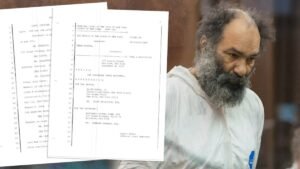The animals on the coronary heart of the unlawful wildlife commerce : Brief Wave : NPR


The unlawful wildlife commerce is estimated to be a multi-billion greenback enterprise. Reside animals which might be caught, like this field turtle, want fast and long-term care at amenities like The Turtle Conservancy.
Ryan Kellman/NPR
conceal caption
toggle caption
Ryan Kellman/NPR

The unlawful wildlife commerce is estimated to be a multi-billion greenback enterprise. Reside animals which might be caught, like this field turtle, want fast and long-term care at amenities like The Turtle Conservancy.
Ryan Kellman/NPR
Behind an workplace constructing in Torrance, CA there’s a small room that smells like rotting strawberries. There, a prison investigator watches his proof crawl round on wooden chips in 5 open plastic tanks.
The field turtles, native to jap North America, have been discovered at a close-by worldwide mail facility in Los Angeles a couple of week prior, packaged in a collection of packing containers certain for Asia.

Just lately, about forty field turtles have been seized. Within the wild, field turtles are an indicator species for his or her habitats. Because of this if a wild inhabitants of them is doing properly, the surroundings is doing properly.
Ryan Kellman/NPR
conceal caption
toggle caption
Ryan Kellman/NPR

Just lately, about forty field turtles have been seized. Within the wild, field turtles are an indicator species for his or her habitats. Because of this if a wild inhabitants of them is doing properly, the surroundings is doing properly.
Ryan Kellman/NPR
The 40-some field turtles have been being illegally exported.
Now, not solely are they proof of the crime — they’re additionally its victims. Distressed, probably sick and half a continent away from a house they’re going to seemingly by no means see once more, the turtles want specialised care and a long-term house.
They’re only one instance of a a lot bigger downside.
Wildlife trafficking is without doubt one of the largest and most worthwhile crime sectors on the planet. The unlawful commerce is estimated to be a multi-billion greenback business.
On a excessive degree, that unlawful commerce causes issues for all the things from world biodiversity to native economies to the stability of complete ecosystems. And on a right away degree, authorities are tasked with caring for confiscated animals and inserting them in long-term care amenities.
One community launched final yr by the U.S. Fish and Wildlife Service and the Affiliation for Zoos and Aquariums hopes to assist. And with wildlife trafficking surging globally, the organizations at the moment are in talks to develop this system to different components of the nation.
Learn extra about unlawful wildlife trafficking and see extra pictures in local weather correspondent Nate Rott’s full story.
Produce other wildlife tales you need us to cowl? Electronic mail us at shortwave@npr.org.
Take heed to Brief Wave on Spotify, Apple Podcasts and Google Podcasts.
Pay attention to each episode of Brief Wave sponsor-free and help our work at NPR by signing up for Brief Wave+ at plus.npr.org/shortwave.
This episode was produced by Berly McCoy, edited by Rebecca Ramirez and truth checked by Nate Root and Rachel Carlson. Gilly Moon was the audio engineer.






